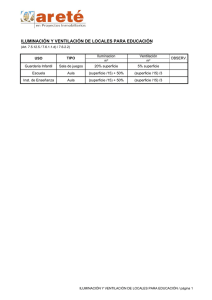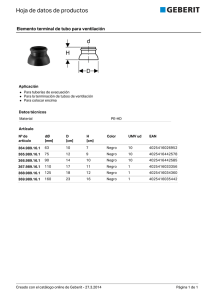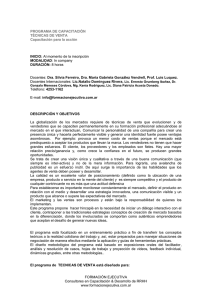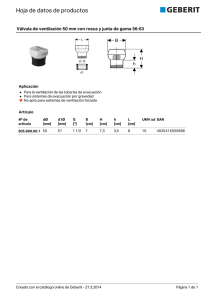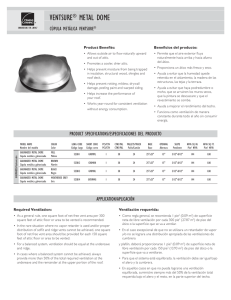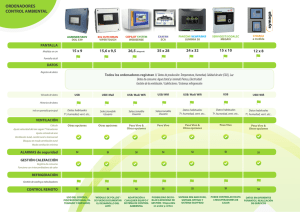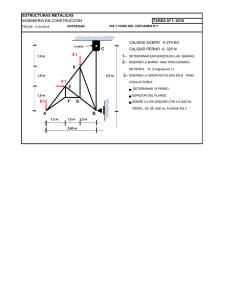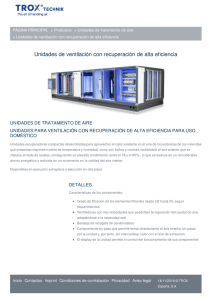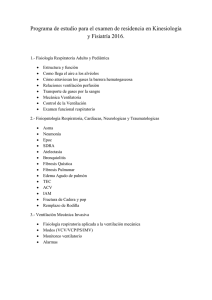I nstallat I on I nstruct I ons I nstallat I on I nstruct I ons
Anuncio
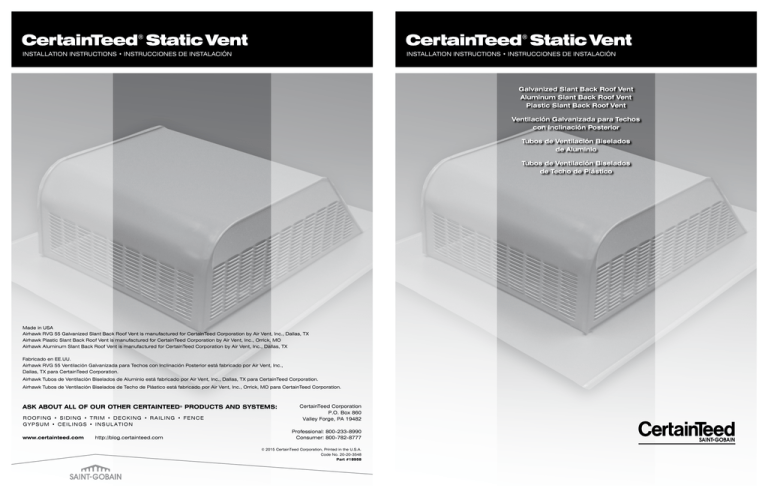
Installation I n s t a l Instructions l a t i o n• Instrucciones I n s t r ude c instalación t i o n s Installation I n s t a l Instructions l a t i o n• Instrucciones I n s t r ude c instalación t i o n s Galvanized Slant Back Roof Vent Aluminum Slant Back Roof Vent Plastic Slant Back Roof Vent Ventilación Galvanizada para Techos con Inclinación Posterior Tubos de Ventilación Biselados de Aluminio Tubos de Ventilación Biselados de Techo de Plástico Made in USA Airhawk RVG 55 Galvanized Slant Back Roof Vent is manufactured for CertainTeed Corporation by Air Vent, Inc., Dallas, TX Airhawk Plastic Slant Back Roof Vent is manufactured for CertainTeed Corporation by Air Vent, Inc., Orrick, MO Airhawk Aluminum Slant Back Roof Vent is manufactured for CertainTeed Corporation by Air Vent, Inc., Dallas, TX Fabricado en EE.UU. Airhawk RVG 55 Ventilación Galvanizada para Techos con Inclinación Posterior está fabricado por Air Vent, Inc., Dallas, TX para CertainTeed Corporation. Airhawk Tubos de Ventilación Biselados de Aluminio está fabricado por Air Vent, Inc., Dallas, TX para CertainTeed Corporation. Airhawk Tubos de Ventilación Biselados de Techo de Plástico está fabricado por Air Vent, Inc., Orrick, MO para CertainTeed Corporation. ASK ABOUT ALL OF OUR OTHER CERTAINTEED® PRODUCTS AND SYSTEMS: ROO F I N G • S I D I N G • TR I M • DEC K I N G • RA I L I N G • F ENCE G Y P SU M • CE I L I N G S • I NSULAT I ON www.certainteed.com http://blog.certainteed.com CertainTeed Corporation P.O. Box 860 Valley Forge, PA 19482 Professional: 800-233-8990 Consumer: 800-782-8777 © 2015 CertainTeed Corporation, Printed in the U.S.A. Code No. 20-20-3548 Part #18958 Insta l l ation Instructions I NSTRUCC I ONES DE I NSTALAC I ÓN Slant I n sBack t a Roof l l Exhaust a t i oVents n Instructions I n s t r u c t i o n s Ventilaciones de escape con dorso inclinado para tejados 1. Positioning the vents on the roof 1. Posicione las aberturas de ventilación en el tejado Position the vents evenly spaced across the roof, below the ridgeline so that the vents can only be seen from one side of the house, yet no greater than 2 feet below the ridgeline. 2. Drill the guide hole 2. Perfore el agujero guía Adjust placement of the vents to avoid drilling through any rafters. Drill a guide hole near the center position of each vent. Ajuste la colocación de las aberturas de ventilación para evitar la perforación a través de algún cabio. Perfore un agujero guía cerca de la posición central de cada abertura de ventilación. 3. Outlining the hole 3. Perfile el agujero Mark correct diameter for the vent you have selected using the chart below. Marque el diámetro correcto para la abertura de ventilación que usted haya escogido utilizando la gráfica de abajo. 4. Cutting the hole in the roof Using a saber saw, cut and remove all the roof shingles (and deck) inside the diameter circle you have marked. Next, cut back approximately 1-inch of the SHINGLES ONLY out of the top half of the hole to allow space for placing and positioning the flange. 5. Positioning the base Make sure the base flange parallels the ridgeline of the roof. Slip the upper half of the flange under the shingles. Center the unit over the hole. For the SLP61, the shingles should stop at the midpoint of the flange while still covering the nails. For all other static roof metal vents, the shingles should lay on top of the flange all the way down to the lower side of the opening. The flange from this point should rest on top of the shingles. If nail holes are provided in the vent they should be used for attaching the vent to the roof deck. 6. Securing the base Attach the flange securely to the roof with at least 8 galvanized roofing nails. Nails should be at least 2" long and should penetrate the vent, shingles and decking. Use a nail in each corner of the flange and along the middle of each side of the vent. Use caulk to seal around each nail. If flange ribbing is present, vents should be shingled down to side flange ribbing only. Use the following chart to determine proper size of opening, based on the model of vents you are installing. Description Model# Net Free Area Roof Pitches Galvanized Vent RVG55ML RVG55BL RVG55BR RVG55WW 50 50 50 50 sq. sq. sq. sq. inches inches inches inches 3/12 3/12 3/12 3/12 to to to to 12/12 12/12 12/12 12/12 8" 8" 8" 8" SLAGR SLABL SLABR SLAWW 50 50 50 50 sq. sq. sq. sq. inches inches inches inches 3/12 3/12 3/12 3/12 to to to to 12/12 12/12 12/12 12/12 8" 8" 8" 8" SLP61BL SLP61WW 61 sq. inches 61 sq. inches 3/12 to 12/12 3/12 to 12/12 9" 9" Aluminum Vent Plastic Vent Coloque las aberturas de ventilación separadas de forma pareja a lo largo del tejado, debajo de la línea de la cumbrera de tal forma que las aberturas de ventilación sólo puedan verse desde una parte de la casa, y nunca más grandes que 2 pies por debajo de la línea de la cumbrera. Diameter of Opening 4. Corte el agujero en el tejado Utilizando una sierra sable, corte y saque todas las tejas (y plataforma) dentro del círculo del diámetro que haya marcado. Después corte aproximadamente 1 pulgada de las TEJAS SOLAMENTE de la mitad superior del agujero para dejar espacio para posicionar la aleta. 5. Posicionamiento de la base Asegúrese de que la aleta base esté paralela a la línea de la cumbrera del techo. Deslice la mitad superior de la aleta por debajo de las tejas. Centre la unidad encima del agujero. Para la SLP61, las tejas deben terminar a la mitad de la aleta y deben asimismo cubrir los clavos. Para todas las demás ventilaciones metálicas estáticas de tejados, las tejas se deben colocar por encima de la aleta hacia abajo hasta el lado inferior de la abertura. A partir de este punto, la aleta deberá descansar en la parte superior de las tejas. Si la ventilación viene provista con agujeros para clavos, estos deberán usarse para acoplar la ventilación a la superficie del tejado. 6. Sujeción de la base Sujete bien la aleta al tejado al menos con 8 clavos galvanizados para tejados. Los clavos deberán ser de 2 pulgadas de largo y deberán penetrar la abertura de ventilación, las tejas y la superficie del tejado. Use un clavo en cada esquina de la aleta y a lo largo del medio de cada lado de la abertura de ventilación. Use masilla para sellar alrededor de cada clavo. Si la aleta es estriada, las ventilaciones deben escalonarse hacia abajo hasta la estría lateral de la brida únicamente. Siga la siguiente gráfica para determinar el tamaño apropiado de la abertura, basándose en el modelo de ventilación que esté instalando. Descripción N° de modelo Área libre neta Inclinaciones del tejado Diámetro de abertura VentilaciónRVG55ML galvanizadaRVG55BL RVG55BR RVG55WW 50 50 50 50 pulgs2 pulgs2 pulgs2 pulgs2 3/12 3/12 3/12 3/12 a a a a 12/12 12/12 12/12 12/12 8 8 8 8 pulgs. pulgs. pulgs. pulgs. VentilaciónSLAGR de aluminioSLABL SLABR SLAWW 50 50 50 50 pulgs2 pulgs2 pulgs2 pulgs2 3/12 3/12 3/12 3/12 a a a a 12/12 12/12 12/12 12/12 8 8 8 8 pulgs. pulgs. pulgs. pulgs. VentilaciónSLP61BL de plásticoSLP61WW 61 pulgs2 61 pulgs2 3/12 a 12/12 3/12 a 12/12 9 pulgs. 9 pulgs.
